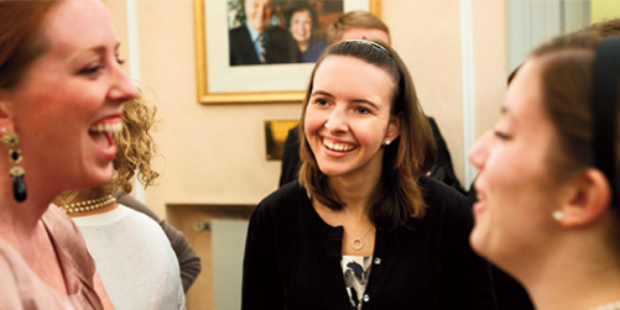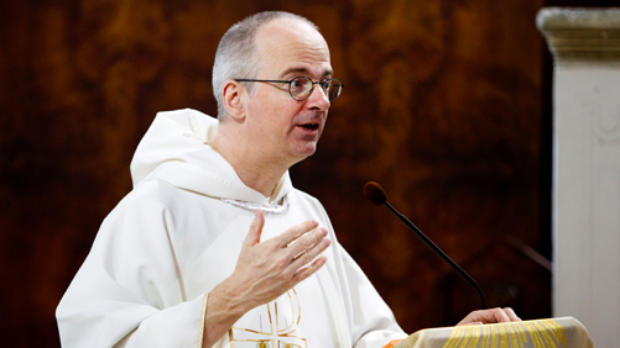When Catholic Studies students go to Rome, their study abroad experience is life-changing. Senior Gregory Westerhaus is one student who recently has been touched by the Eternal City. “It was, without question,” he writes, “a life-changing experience.” He valued his classes, particularly a theology course. In addition, he found the formation program invaluable.
Westerhaus notes, “Oftentimes, people may hear the word ‘formation’ and automatically assume that it pertains solely to seminarians or people discerning the religious life. But for those of us not in seminary, those formation days were essential. When we non-seminarian guys met once a week, particularly with Deacon Rich, it was just a relaxed atmosphere, talking about things that pertained to what it takes to be a true, solid Catholic man. It wasn't like we were simply reading Bible verses and discussing their meaning, but we were incorporating faith into our lives in very real ways and getting advice from those that have studied for years on theessence of the faith.”
Rome as a Transformational Experience
All study abroad programs provide an intense experience. But, argues Father James Shea, president of the University of Mary in Bismarck, N.D., Rome is more potent as the cradle of Western law and culture and the home of the Church. “H.V. Morton said, ‘A visit to Rome is not a matter of discovery, but of remembrance,’” says Shea. “I’ve found this is true from experience. Among the cobblestones, things you know come alive. This is even more true for Catholics. Rome is a potent city, the nexus of all things.”
Like Shea, Robert G. Kennedy, chair of the Department of Catholic Studies, believes that Rome presents special opportunities that can be found nowhere else. One of these opportunities is, as Shea mentioned, the opportunity to understand and appreciate the history of the Church. In addition, Kennedy says, “Visiting Rome, and especially the Vatican, one cannot help but be impressed that the Church belongs to all nations and all peoples. Where else in the world can one see people from so many different cultures working together from a common vision and commitment? For Americans especially, it is powerful and enriching that our students come back to their dioceses and parishes with a vibrant sense of the global community that is the Church.”
Father Joseph Carola, chaplain for the Bernardi Campus, says, “When you leave your culture, you are open to many things, which enable tremendous growth. It allows you to see your culture from without – in this case, through the eyes of Europeans.” But while all study abroad can provide this opportunity for students to see their culture through the eyes of others, he goes on to say that students who go to Rome are uniquely positioned to grow in faith, as they study in the heart of the Church. In addition, living in community is an important factor in students’ growth. “The Bernardi Campus is an experiment in Christian community with Christ at the center, specifically in the Eucharist.”Formation and community nights are yet another way Rome offers students a unique opportunity that they may not have in other locations. Over the years, Carola notes, students have been exposed to “everyone short of the Pope.” And, of course, while students may not actually converse with the Pope, the proximity of the Vatican allows them to attend a General Audience or Mass where they can see him.
As students are transformed by Rome, they are formed into religious and lay men and women who will actively participate in and shape the life of the Church. Shea has seen the value of this transformation firsthand. As a seminarian at the North American College in Rome, he worked with Father Peter Laird in the pastoral care of the students on the Bernardi Campus during the 2001-02 school year.
“It was a marvelous experience,” he says. “I have very fond memories of the students from that time, and I still remember them in prayer all the time. There was a brightness in them, and they made a profound difference in my life and in my priesthood.” He is still in touch with some of the students, including laymen who later became seminarians. “It has been wonderful to watch their lives unfold,” he says.
This unfolding of their lives includes how these men and women touch the Church and the world as a result of their experiences in Rome. Shea says, “The formation of young women and men of many professions and walks of life who genuinely love the Church and have come to understand her more deeply right in the shadow of St. Peter’s has inestimable value. This is true if the young people are destined to become priests and religious or dedicated laypersons and professionals. A genuine program of formation which attends to the whole person in such an extraordinary setting is a rare and precious contribution in the life of the Church.”
The students contribute to the life of the Church before they even leave Rome. “St. Thomas students bring the best of our country to Rome,” notes Shea. “They are among the best-formed, educated young American Catholics our nation has to offer.” As such, they contribute to the experiences of students from other nations who have come to Rome to learn and be transformed.
Upon their return to the United States, Shea believes the students experience both short-term and long-term effects from their time abroad. “They come back with a deeper eagerness to see what God has called them to do.” Beyond this eagerness, the students develop a new orientation for the long-term. “You can’t go to Rome without asking questions about your life and its trajectory,” says Shea.
Kennedy sees this “deep eagerness” as essential to the program’s success. “Concerning the value of our Rome program to the Church, the most important thing may be the deepening of a commitment in the students themselves to shape their lives, whether lay, religious or clerics, around their faith commitment. I think the experience of Rome encourages our students, reminds them that they are not alone in this, and lives them an immersion into a community of prayer, learning and friendship that will not leave them unchanged.”
The Bernardi Experience as a Model ProgramSt. Thomas’ program in Rome extends its influence far beyond the lives of the students who have participated in the program. As he worked with St. Thomas students on theBernardi Campus, Shea saw the “life-changing experience” described by Westerhaus. “I came to understand something about the impact that the city of Rome can have upon the intellectual, human and spiritual development of a young person. I had experienced that for myself when I moved to Rome and began my theological studies there. But myexperience at Bernardi brought it all to life in a fresh way. The wonder and joy I observed in the students entrusted to my care, their sense of awe and devotion and adventure, planted a deep conviction in me about the imprint the Eternal City canleave on a young mind and heart.”
Seeing the transformation in the lives of St. Thomas students made Shea determined to extend the opportunity to more young Catholics. “When I became president of theUniversity of Mary,” he says, “it came to my mind that providing a similar experience for our students here would be a real help to them. And so we began looking for a location for the University of Mary’s own campus in Rome, which is now in its second year of operation. Our students return to us full of wonder, their lives changed by a deeper understanding of the world, the faith and themselves. It’s marvelous.”
He continues, “One of the hopes for our program is that our students return to our main campus equipped to engage deeply in the life of our community here, that they be a leaven for real renewal in our mission as a Catholic university and a place for the encounter between faith and reason.” At St. Thomas, the goal is the same: as Rome transforms the students who go there, they will return to engage the campus and later the world, prepared to act as transformational agents themselves.
Read more from Perspectives







